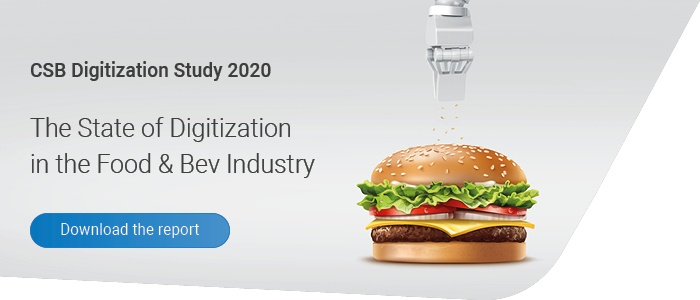According to the “Computerwoche” magazine, nearly every company anticipates gaining a competitive edge by implementing Industry 4.0. About 40 percent expect savings in production costs or general cost reductions. Industry 4.0 has raised high expectations.
What is Industry 4.0, anyway? Industry 4.0 is the fourth phase of industrialization. After mechanisation, electrification and automation of the factory, production is connected to a network. Machines, systems, raw materials and products communicate via the internet - without needing a human being. In the English speaking countries, it is also referred to as Industrial Internet of Things (IoT). However, it is becoming increasingly evident that this term stands for very concrete solutions from the area of digital production. When you walk through a modern food factory today, you will come across more and more fully automated systems, employees with handheld devices and warehouses that are largely self-organizing. Industrial robots are taking on tasks to an increasing degree. Sensors as the basis of networked production are constantly getting better. Many other examples illustrate that information and production technologies have grown much closer.
How companies introduce Industry 4.0
From an evolutionary perspective, many businesses in the food and beverage industry are still in the third industry revolution. They are using electronic and IT systems for further automation of their production. However, they still have to undergo metamorphosis into a Smart Factory.
Basically, there are two ways for putting Industry 4.0 into practice: The big-bang approach, or a small-steps strategy. The downside of the big-bang is that the development of smart technologies is far from being completed. The advantage of taking small steps is that today, there are many technologies that you can use profitably right away. These technologies make your factory not only smarter, but also more efficient. Companies from the food & beverage industry should therefore proceed as follows:
- Digitize processes. Many processes, that still run manually today or that are only partially digitized, have to be digitized completely. Software is crucial for this. It is the nervous system of the factory and represents the basis for Industry 4.0. With its CSB FACTORY ERP, for example, CSB has developed a software that supports all processes in a factory and that has standard interfaces to a Group ERP system as well as to the machines. In this way, the basis for comprehensive digitalization is established at the factory. Digitalization of the processes reduces errors and costs and minimizes lead time.
- Create transparency. The important next step is to utilize this data. Decision-makers use dashboards and reports to gain a clear overview of all areas in the factory - of course, assuming that the processes were digitized. Such transparency facilitates improved control. For this purpose, CSB offers CSB Linecontrol as a solution for managing and optimizing production and packaging facilities.
- Improve automation. Process steps that have not been digitized yet can be embedded in and connected to a network by means of automation and state-of-the-art sensors. A classic example is data capture at goods receiving. By immediately entering the goods (for example, using industrial image processing), checking their quality, weighing and grading them, subsequent steps can be planned and calculated precisely.
- Use artificial intelligence. When sufficient data is available, the systems can apply the available data and parameters to make a decision - or, at least, provide a basis for decision. This results in self-controlling systems with self-learning capabilities through artificial intelligence (AI). Particularly the comprehensive use of AI may sound like science fiction. Yet, China, Germany and the USA are pushing this development. Data processing will play an ever-increasing role, that much is certain. Only by making the factory smart will companies be able to meet the requirements of the future: Maximum cost and resource efficiency, full traceability, maximum quality and hygiene, fast response times and optimum fulfillment of trade and consumer requirements. There is no doubt about it: The earlier you make use of these advantages, the better.
Digitalization pays off
The Smart Factory is not a mere vision anymore. In fact, the use of smart technologies pays off, as is demonstrated by digitalization pioneers in the food industry. Two examples:
The Sander Group, one of the big players in the convenience products sector, has achieved enormous growth with the help of digitalization. The highlight is the CSB production planning for the approximately 2,500 different dishes. The software enables Sander to draw a fine line between industrial production of large quantities and flexible “work on call”. Individual customer requests and spontaneous orders can also be integrated into process planning in the shortest possible time. “In production planning we have reached a level at which we are a few steps ahead of other companies,” says Managing Director Jens Sander.
At Züger Frischkäse AG, digitalization enables maximum efficiency in the production of smallest batches. The Swiss cream cheese specialist produces cottage cheese, ricotta, mozzarella and many other items, and exports them throughout the world. In order to keep the processes in the factory as lean as possible, Züger has connected all areas of the company with the CSB-System. CEO Christof Züger: “As a dairy company with many small batches, we need sophisticated IT. We have already installed a lot in our factory to live Industry 4.0. This results in many benefits for us, but also for our customers.”


